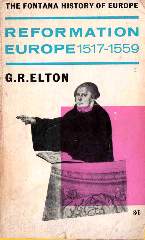 Review of
Jewish 1960s Textbook Example
G R Elton: Reformation Europe 1517-1559 (1963)
Review of
Jewish 1960s Textbook Example
G R Elton: Reformation Europe 1517-1559 (1963)Part of the post-1945 wave of Jewish distortions Dec 2012
** This review was banned by Amazon 1 Feb 2015! **
This book is a perfect example of the coming together of Jewish interests in post-Second World War Britain. The publication date (1963) was exactly right to catch the generation after the war. Its approach - a breezy run-through with little interest in human dynamics and passions - was just right for pupils/students entering the wave of University expansion, and just right for their teachers/lecturers. I have a much-thumbed copy that was clearly (judging by the precise female names signed inside) passed between several female students of the time. It's slightly unfair to say the book supplies keywords for examinations (Renaissance, theology, Papal bulls, Luther, Zwingli, Calvin, Charles V, Ottomans, Counter-Reformation ..; and arts and science material - shoehorned notes in passing on Holbein, Titian, Durer; Vesalius, Servetus, Copernicus ...) but generally judgements are conventional givens. More seriously, vast swathes of material are smoothly and deliberately ignored.
It's a safe guess to say almost every 'arts' graduate in the 1960s and 1970s, and therefore a large proportion of anonymous civil servants, BBC hacks, teachers, and journalists in Britain, were exposed to this book.
Elton (father's name Ehrenberg) was a 'German Jew' - his father's book on Reformation finance is listed in the bibliography, along with a volume of the Cambridge Modern History which Elton edited - with what appears an uncanny ability to get promotion; I'm reminded vaguely of 'Gerald Fleming' from the audio-visual aids department at Surrey University). He was a supporter of Churchill, and Margaret Thatcher - who of course both spent their lives working for Jewish power. Another book by Elton, 'The Practice of History', presents an image of historians, especially himself, as gentlemen scholars, examining all sides, in a carefully impartial manner, though drawing the line at anything rigorous. He had a high opinion of Maitland, Mommsen, and Namier; and said little or nothing about Belloc, Buckle, Hume, Malthus, Toynbee. Much of 'The Practice of History' deals with literary style; he says, maybe following Russell, that history is both an art or a science. All this is exactly analogous to, and as misleading as, the image of scientists as honest pursuers of truth through rigorous experimentation and hypothesis testing.
Elton's book has nothing on Luther's views on Jews. This was a serious part of Luther's thinking, but Elton doesn't mention it. However, he does mention Luther on the peasants; in both cases Luther's language was rather violent, but only one of these groups gets attention. There's nothing on Jews in eastern Europe - despite a special section, clearly appended as an unimportant afterthought, on Poland, Lithuania (far larger than today), Hungary, etc. There is nothing whatever on Jews opening the door to Muslims, as also happened in Spain: the Ottoman Empire was lapping at Europe's borderlands but the bitter and vicious struggles are not important to Elton. There isn't even anything on the Fuggers, although the 'Fuggerzietungen' of 1568-1605 (partly published in English in 1926) provided evidence of their financing of Charles V and others. These were an important force against the Reformation; and they lost all their money - which I suspect may have provided a lesson to subsequent Jewish financiers to prefer stocks, bonds, paper. Elton has a curiously detached view of such events. At first sight it appears to be a judicious summary, examining power without morality. In fact I'd suggest it's a Jewish attitude: nobody matters except Jews. The Sack of Rome, for example, [1527] gets a few sentences; but arguably it destroyed the Renaissance, and was a naked grab for money, and surely deserves some examination in a history of Europe? The discovery of the New World - surely one of the most horizon-expanding events ever - gets slender treatment. At least Scaliger Jr. gets noticed.
As to the religious ideas, there is drivel about Catholic abuses, idolatry, the universal church and truth vs individualism; but nothing is assessed seriously, insofar as evidence would allow. It's not credible that the students who read the relevant chapters, probably with decreasing interest, could have taken away any real understanding. I suppose they'd have memorised a few phrases, perhaps the titles of Papal bulls, and some theological terms. Incidentally I wondered if Zwingli was Jewish (Randi, the conjuror, had this surname; Calvin maybe too), and putting the Jewish view. Elton gives no information whatever on Jews' sacred books, though there must have been some influence. For some reason Paolo Sarpi, who wrote on the Council of Trent, is omitted; at least I didn't notice him.
The full reasons for University expansion must have included a desire for trained manpower, of a sort. Whether Elton exploited this novelty, or helped lead and shape it, I can't tell.